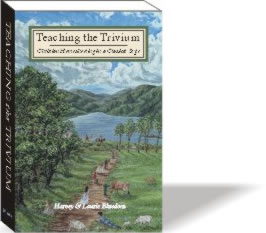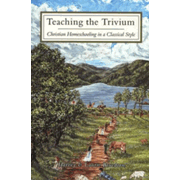The Bluedorns are true pioneers in classical Christian education. For years, they've been sharing what they've learned through their research as well as through their experience teaching their own children, and through interaction with thousands of other parents across the country.
They share a growing enthusiasm for classical education, but they temper their enthusiasm with cautions about pagan content. Rather than buying into the "Great Books" model of classical education, the Bluedorns apply the methodology while carefully selecting resources that support a biblical Christian worldview. Some of those resources are among the Great Books while others are not.
The Bluedorn's philosophy of education is presented at length in the first part of their new book, Teaching the Trivium. However, they also address broader issues such as government control of education and its conflict with biblical principles, problems with classroom-style schooling, arguments for teaching Latin, Greek, and Hebrew (as well as some "how-to" information), charts showing "classical" sources for teaching ancient history for each time period, and discussion of various homeschooling methods and how they can be adapted (or not) to classical education. This is one of the rare places where the contrasting ideas of Dorothy Sayers and Charlotte Mason for elementary education are addressed. All through this section, I especially appreciate the Bluedorn's flexibility; they suggest numerous ideas for content, presentation, and timing but leave it to parents to decide what makes sense for their own children.
Chapters eleven through fifteen get into very specific suggestions for teaching the various subjects at different age levels. Also, flip back to the last forty pages of the appendix for extensive resource lists that identify curriculum and resources that fit the Bluedorn's methodology.
In addition to resources lists, the Appendix features sixteen articles that address more specialized topics such as Dorothy Sayers' "The Lost Tools of Learning," "Ancient Education: Hebrew, Greek, and Roman," and "The Trivium in Scripture."
Teaching the Trivium is a valuable contribution to the discussion regarding classical Christian education. The Bluedorns have been writing, speaking, and sharing online for years, but it is wonderful to have so much accumulated wisdom finally collected in one volume. This is an opinionated book, reflecting the strong convictions the Bluedorns have developed over the years. They approach their subject from a serious Reformed perspective, relying on Scripture as the ultimate authority. Even those Christians who might not share the Bluedorn's theological perspective should find this book helpful if their goal is to use the classical model of education by drawing from it that which is worthy, while staying true to biblical principles.










